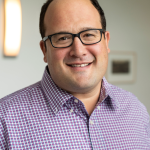
Funded by Gastric Cancer Foundation
With an extensive cohort of gastric cancer genomic data, there are many new avenues for translational research and clinical investigations. Importantly, a registry this size provides significant degree of statistical power, thus providing researchers with an invaluable resource. Researchers and clinicians in any discipline and at any institution across the world may access this data for independent discovery and validation studies. For example, an investigator may access the data to answer the question, “I found that H. pylori infected patients often have downstream functional mutation in the gene MUC1; can this finding be replicated in another patient population?” The end results may be a new practical and scalable early detection technology, or a precision therapy for gastric cancer patients. Ultimately, the GCR is designed to be a resource for accelerating gastric cancer research.

FUNDED BY THE STUART SCOTT MEMORIAL CANCER RESEARCH FUND WITH SUPPORT FROM BRISTOL MYERS SQUIBB
For the past 20 years, the number of people under the age of 50 who are diagnosed with colon and rectal cancer has been rising very quickly, especially among Latinos living in the US and in Mexico. In fact, it is predicted that in the next 10 years, 1 in 10 colon cancer cases, and 1 in 4 rectal cancer cases will be in people younger than the age of 50. Currently, very little is known about the reasons behind this. We think that the food we eat, and our behaviors may play a role in getting colon and rectal cancer. We also think that the type of bacteria in our gut may predispose certain people to getting cancer at a younger age.
In order to explore this, we plan to invite 90 people in California and Mexico City, who identify as Latino, and who were younger that 50 when they were diagnosed with colon or rectal cancer to participate in our study. We will ask them to collect one stool sample at home, and will study the bacteria in that sample as well their tumors. We will also collect detailed information about the foods they eat, and their background using surveys. Overall, we hope to gather very important information that could help us understand why colon and rectal cancer is on the rise among younger people. This information could also help us identify new ways of preventing colon and rectal cancer in the future.

Funded by Hooters of America, LLC
One in every eight women will be diagnosed with breast cancer in a lifetime. But it doesn’t impact everyone equally. While Caucasian women are more likely to be diagnosed with breast cancer, African- American (AA) women are more likely to die from the disease. In addition, AA women are more likely to be diagnosed at a younger age and have a more aggressive form of breast cancer. There have been many improvements in the treatment of breast cancer leading to a lower chance of dying from the disease. But AA women have not been shown to benefit as much as Caucasian women from these advancements. There are many factors believed to be the reason for this racial difference in survival. But there is a need for more research into this area. One way to better study these factors is within the context of a clinical trial. AA women are historically less likely to be in a cancer clinical trial study. This proposed study is aimed at increasing the enrollment of AA female breast cancer patients in clinical trials at UCSD by creating a clinical trial education program to both educate and engage the community. This is predicted to lead to a decrease in the current breast cancer survival disparity.

Funded by Gastric Cancer Foundation
Gastric cancer is the fifth most frequently diagnosed malignancy in men and women, with nearly 800,000 deaths per year, making it the third leading cause of cancer related death worldwide. Therefore, it is critical to find more effective therapeutic approaches for this disease. Our group has investigated the molecular make up of gastric cancer using large patient cohorts to better understand the differences of molecular markers in gastric cancer and to identify new targets for drug development. Our research was able to find one of the main regulator of tumor growth and spread. This genetic alteration is called lysine methyltransferase 2 (KMT2) which is frequently altered in gastric cancer and a key driver of tumor growth. When normal tissues loses this gene, this tissue can became cancerous by promoting the development of tumor cells. Our group (Wang J, et al., JCO, 2020) was one of the first working on this particular gene and has recently conducted a comprehensive analysis of 1,245 patients with advanced gastric cancer, whose tumors were analyzed using with comprehensive and cutting edge molecular testing technologies. We found that patients with the KMT2 mutation have very unique tumor characteristics such as changes in the DNA repair pathways which makes them very vulnerable to specific chemotherapeutic drugs but also novel targeted therapies. Our project focuses on studying what the best treatment therapies for this uniquely subgroup of gastric cancer patient will be and explore existing and novel agents to improve outcome in patients with gastric cancer. The goal is that our project will lead to more effective and less toxic treatment options for patients with gastric cancer.

Funded by Lloyd Family Clinical Scholar Fund
Leukemia is a cancer that starts in blood-forming cells found in the bone marrow. It is the most common cancer in children and teenagers, accounting for almost 1 out of 3 cases. Despite recent advances in the treatment of childhood leukemia, a substantial proportion of patients are resistant to conventional treatments. For these children, the probability of cure is very low (<30-50%). The best treatment for leukemia patients, especially those who have not responded to other therapies, is stem cell transplant, but the application of this life-saving treatment has been traditionally limited by a lack of suitable donors. The lack of suitable donors is a particular problem in African American or mixed heritage populations because finding a matched donor is less likely in these populations. We have developed a stem cell transplant strategy that greatly increases the number of patients who can receive transplants. However, this strategy cannot provide the critical anti-leukemic and infection fighting functions required to kill all the leukemic cells and is therefore unable to give patients who receive transplants long term cancer-free outcomes. In this project we will perform three clinical trials designed to test the safety of three innovative cell therapies, which, when given in conjunction with our stem cell transplant strategy, have the potential to fight leukemia. Our ultimate goal is to identify the optimal anti-leukemic cell product that improve cancer-free outcomes for children with leukemia.

Co-funded by the Dick Vitale Gala, and WWE in honor of Connor’s Cure
DIPG is a universally fatal brain tumor that occurs in children. Thanks to extensive research, we now understand the biologic causes of DIPG, but no one has found an effective way to treat the disease. Patients receive radiation to slow the disease and relieve symptoms, but they almost all die within two years of diagnosis. We have found that a target known as GD2 is highly expressed on DIPG. GD2 can be targeted with an antibody that is FDA approved to treat another type of cancer. When the antibody finds its target, it recruits immune cells to “eat” the cancer cells. Here, we propose combining anti-GD2 with another antibody that stimulates the immune system to “eat” cancer cells (anti-CD47). Because antibodies cannot reach the brain when given in the blood, we will deliver these two antibodies by direct injection into the tumor. Our main goal is to test this approach in mouse models of DIPG to see if it is safe and effective. This will hopefully serve as the basis for a clinical trial for children with DIPG. We will also explore alternative and complementary ways to attack the tumors.

Funded by Gastric Cancer Foundation
My research interest is cancer genetics with an emphasis on clinically relevant questions that will improve our understanding of the cancer genetics of clinical phenotype and simultaneously improve patient care in oncology. I have extensive bench research experience in the fields of genome sequencing technology development, human genetic analysis through human genome sequencing and molecular assay development. My research benefits from the various innovations in genomic and genetic technologies that my group has developed.

V Scholar Plus Award – extended funding for exceptional V Scholars
Tamoxifen is an extremely effective drug for patients with estrogen sensitive breast cancer but it comes with a variety of side effects, including hot flashes. We use mice to test if symptoms similar to hot flashes are mediated by the effects of tamoxifen on the brain. We study a region of the brain that is very sensitive to estrogen and controls body temperature. We have identified differences in this region that are associated with changes in body temperature during tamoxifen treatment. Our immediate goal is to test if we can use this knowledge to block temperature changes in mice receiving tamoxifen. Our hope is that these studies could one day help us reduce hot flashes and improve the lives of breast cancer patients and survivors.

Volunteer Grant funded by the V Foundation Wine Celebration in honor of Roger and Sally Krodel’s granddaughter, Angie Cerreta-Palauqui
Therapies to kill cancers typically get rid of the dividing cells. However, the few that remain are a mixture of resistant cells that can return later to form more tumors. This is a difficult problem to solve. My research looks into finding out which genes cancer cells choose to use when they are not dividing to repair their damaged DNA and survive. Our goal is to develop treatments that will interrupt those genes that cancer cells use so they can die. We also want to develop treatments that can not only work to stop many different types of cancers, but that can also work in combination with other therapies to block the return of cancers later in life. The potential long-term success of our research will help to ease the anxiety of cancer survivors by extending the cancer-free period indefinitely.

The overarching goal of research in my laboratory is to understand how cancer cells metastasize and spread to vital organs in the body, such as the lung, liver, bone and brain. In breast cancer patients, metastasis leads to death in over 40,000 women in the U.S. each year. The possibility of progression to stage IV, metastatic disease is a constant source of fear and anxiety, since 30% of patients eventually progress to metastasis and survival for these patients is very poor (<3 years). Despite its prevalence, metastasis is an incredibly complex biological process that is very challenging to study due to the limited availability of authentic model systems. My laboratory has developed an innovative new approach to study metastasis in high resolution, using cutting-edge new single-cell technologies to study how individual cancer cells spread in human patient tumor models of breast cancer. Using our approach, we have found that cancer cells use a specialized form of cellular metabolism in order to spread. In our proposed study, we will investigate why and how this form of metabolism promotes cancer cell spread, and we will explore the effectiveness of using metabolic inhibitors to prevent metastasis and fatality in cancer patients.













